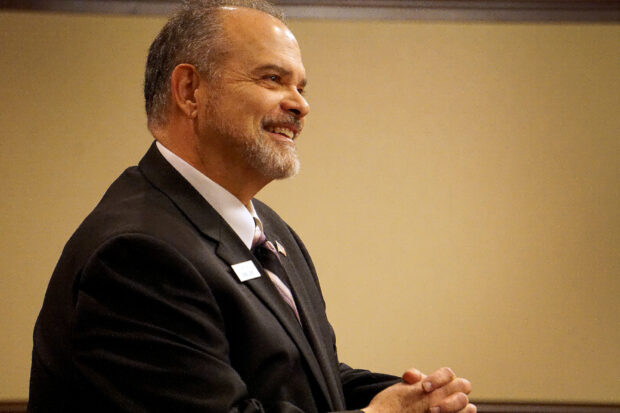The Senate Education Committee advanced a bill Tuesday designed to narrow the focus for school boards evaluating local superintendents.

Sen. Dave Lent, an Idaho Falls Republican who served on his local school board, pushed Senate Bill 1279.
The bill would narrow the focus on superintendent evaluations to three metrics:
- Third-grade literacy, as measured by the Idaho Reading Indicator.
- Eighth-grade math, as measured by the Idaho Standards Achievement Test.
- High school graduation rates.
Districts could include additional criteria, at their discretion.
Lent said he brought the bill to ensure the focus remains on student achievement.
Often, Lent said, many new school board members don’t have experience evaluating executive level officials, such as superintendents, when they first are elected.
This could help them focus.
“Our boards, typically in this state, are underprepared for decisions they have to make,” Lent said.
SB 1279 heads to the Senate floor with a recommendation it passes.
New tax bills surface
It was cleanup day in the House Revenue and Taxation Committee, as two powerful lawmakers offered minor rewrites of major tax bills.
House Speaker Scott Bedke brought a new version of his bill to increase Idaho’s grocery tax credit. Like its predecessor, the bill would increase the credit to $135 per person. Currently, most Idahoans receive a $100 credit and seniors receive $120.
The new bill is designed to clarify the flow of money from Idaho’s Tax Relief Fund, said Bedke, R-Oakley. The fund, bankrolled from sales taxes on online purchases, would cover the $48 million to $49 million needed to increase the grocery tax credit.
House Majority Leader Mike Moyle brought a revised bill to freeze property taxes for one year, with one clarification. The freeze would not affect school levies — the supplemental and plant facilities levies voters approve, or the emergency levies trustees can impose when enrollment increases.
Moyle, R-Star, said his goal is to bring local governments to the table to come up with a long-term property tax solution. “This is a way to stop the bleeding while we come to those conclusions,” he said.
Rev and Tax introduced both bills with little discussion, setting the stage for a full hearing at a later date.
Driver’s education fees
Senate Education passed a bill to increase the reimbursement that school districts receive for offering driver’s education training.
Under Senate Bill 1278, the reimbursement would increase from $125 to $150. The money is generated from driver’s license fees.

Sponsoring Sen. Janie Ward-Engelking, D-Boise, and the Idaho School Boards Association said the bill would help schools cover their costs. They pointed out that the driver’s education reimbursement rate has not changed since 1996.
However, Idaho Freedom Foundation Vice President Fred Birnbaum argued that the reimbursement would give school-sponsored driver’s education programs an advantage over private driving schools, which are not eligible for reimbursement.
Senators advanced the bill after some argued that driver’s education is a public safety issue, and school-sponsored programs might be the only option for some rural students.
“If it hadn’t been for driver’s education, I might still be riding my bicycle around eastern Oregon wondering what was happening next,” said Senate Majority Leader Chuck Winder, R-Boise.
SB 1278 heads next to the Senate floor for consideration.
A series of similar driver’s education bills have stalled out in the Legislature in past years. A similar bill sped through the Senate on 31-3 vote last year, only to crash into a wall of resistance in the House, where it failed on a 30-38 vote.
Testing alternatives
Finally, Senate Education advanced a concurrent resolution urging the state to consider alternatives to the 10thgrade Idaho Standards Achievement Test.
Pushed by Vice Chairman Steven Thayn. R-Emmett, Senate Concurrent Resolution 120 urges the State Board of Education and State Department of Education to “research alternatives to the 10th grade ISAT.”
The Senate’s approach here is telling. Rather than calling for the immediate and outright removal of the ISAT, Thayn is asking policymakers and state officials to work together, research their options and bring together proposals for replacing the ISAT.
That stands in stark contrast to the approach some House Education Committee members are taking with academic standards, where some legislators have threatened to repeal standards even though they have no other standards lined up to replace them with.
The resolution is “not asking to get rid of the ISAT flat out,” Thayn said. “It’s (saying) let’s have a discussion, see what other states are doing. That’s really what it is asking for.”
Superintendents from the Melba, Wilder and Bruneau-Grand View school districts testified in support of Thayn’s approach.
Idaho Education News reporter Kevin Richert contributed.
